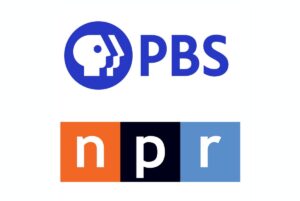Trump’s move to stop taxpayer funding of PBS and NPR is long overdue
President Trump, having had enough of the constant bias that’s been spewed from public broadcasting for years, has signed an Executive Order to cut it off from public funding. It’s not the end of PBS and NPR, because they have other funding sources, but still, they’ll fight it.
Trump is likely to win this battle for several reasons.
First, even though it’s not a large budget item, it’s just another unnecessary expenditure similar those the DOGE Commission has found. Second, the media landscape is cluttered with platforms that do what public broadcasting does. Third, Trump is right about the left-wing bias in public broadcasting, and that means about half of the American people disagree with the political ideology their tax money is funding.
AUDIO: Random Samplings of a Logical Mind
The Associated Press, itself a far-left news outlet, published a scathing piece about Trump’s actions, claiming (in a supposedly down-the-line news article) that this is just more of the President’s determination to punish his political enemies:
“It’s the latest move by Trump and his administration to utilize federal powers to control or hamstring institutions whose actions or viewpoints he disagrees with.”
AP noted that the broadcasters get about half a billion dollars from the government, which means from taxpayers.
Been there. Done that.
Some years back, my good friend Max Rudolph visited my radio studio where I was doing a small syndication. Max was the General Manager of KNCT-TV and KNCT-FM at Central Texas College in Killeen. We debated the plusses and minuses of taxpayer-funding broadcasting. I don’t have a clear recollection of all that was said, but I recall that Max made a good case.
RELATED: Can the Mainstream Media Survive in Donald Trump’s America
My point was that tax dollars were not necessary and that there were other ways to bring in revenue such as selling commercial the way most radio and TV stations do. We shook hands, and some years later, upon the retirement of Mr. Rudolph, I became the general manager of KNCT-FM.
Why would I take that job?
First of all, I wanted to get away from the jerk-lawyer that owned my radio syndication before I punched him out or worse. Second, KNCT-FM did not engage in politics in any way. Third, the people at Central Texas College and those who worked at KNCT-FM were great people who were open to my vision for the station.
I was only there a short time, but I learned a lot about how a public station operates. KNCT-FM received some funds from the Corporation for Public broadcasting, and conducted fundraising membership drives like all other public stations. It also played “beautiful music” and served the community with a variety of public service programming. It still does. And it does not carry programming from NPR.
If more public stations were apolitical or politically balanced, I doubt that Donald Trump would have noticed them.
Unfortunately for fans of “Nova” “Antiques Roadshow,” and “Austin City Limits” on PBS and “All Things Considered” on NPR, when public broadcasting covers politics it’s generally from the left-wing point of view. Pretty much no one disputes that. And that’s okay – with one exception. MSNBC is insane-left and CNN is maddeningly left. ABC, CBS, and NBC all feature newscast and Sunday morning shows with a left-wing slant. The difference is taxpayer dollars.
Uri Berliner comes out of the closet.
Berliner was a senior business editor for NPR, who in 2024 took the time to poll the newsroom at NPR’s Washington headquarters to see how many registered Republicans there were compared to have many Democrats. The tally turned out to be 87 Democrats and zero Republicans. That’s left-wing diversity in action. He wrote a piece for the Free Press, and that facilitated a lot of I-told-you-so’s. Here’s the headline of Berliner’s piece:
I’ve Been at NPR for 25 Years. Here’s How We Lost America’s Trust.
He mentioned bias with regard to the usual suspect stories: Russian collusion, the Hunter Biden laptop, the COVID-19 lab-leak theory, and he claimed that leadership at NPR reacted to the George Floyd story by declaring America as racist and that NPR’s mission would be to change it.
But that’s not all. Berliner went on to explain how NPR has a lack of “viewpoint diversity on issues such as the LGBTQ agenda and the Israel-Gaza war. Editors wished to avoid terms such as “biological sex.”
PBS is no better.
The halcyon days of the MacNeil/Lehrer Report are long gone. Today we have programming such as “The PBS News Hour” which features a segment called “Brooks and Capehart.” This is where the New York Times’ David Brooks debates the Washington Post’s Jonathan Capehart. This is like having MSNBC’s Joe Scarborough debating CNN’s Dana Bash. In poker, we call that two of a kind.
Video: Brooks and Capehart on Trumps’ first 100 days and the defunding of public broadcasting.
Is there a better way for public broadcasting – without public funding.
Of course, President Trump will likely need a bill to start in the House and move to the Senate and then come to his desk to actually get rid of public broadcasting funding. The business model will need some revamping.
My old argument that PBS and NPR stations ought to be allowed to sell advertising still holds up. They already do sell it, but it’s low-key and comes in the form of underwriting and grants. But why not allow public stations to sell outright like commercial station do? They could still ask for donations from “viewers like you.”
RELATED: Disappearing Newspapers should try Fair & Balanced approach
Then, there’s the matter of the licenses, which are worth a lot of money. These licenses could be converted from non-commercial to commercial, and the PBS and NPR outlets would just be regular stations that carry specialized programming. The Corporation for Public Broadcasting would no longer be needed. There’re a lot of things to think though. Should colleges own radio and TV stations? Should all the public station be up for grabs by the six or seven big companies that own most of the networks and cable channels? Should they be designated to remain under local ownership?
One thing’s for sure.
When all public funding has evaporated, PBS and NPR will exist in a competitive environment, fighting for an audience in the same manner the rest of us do. If the programming they offer is as vital as they claim it is, they should have no trouble staying on the air. The difference is that those of us who may not agree with their ideology will no longer be subsidizing it.
 Lynn Woolley is a Texas-based author, broadcaster, and songwriter. Follow his podcast at https://www.PlanetLogic.us. Check out his author’s page at https://www.Amazon.com/author/lynnwoolley.
Lynn Woolley is a Texas-based author, broadcaster, and songwriter. Follow his podcast at https://www.PlanetLogic.us. Check out his author’s page at https://www.Amazon.com/author/lynnwoolley.
Order books direct from Lynn at https://PlanetLogicPress.Square.Site. Email Lynn at lwoolley9189@gmail.com.
Always looking for support from Readers Like You! What the heck, just buy a copy!


